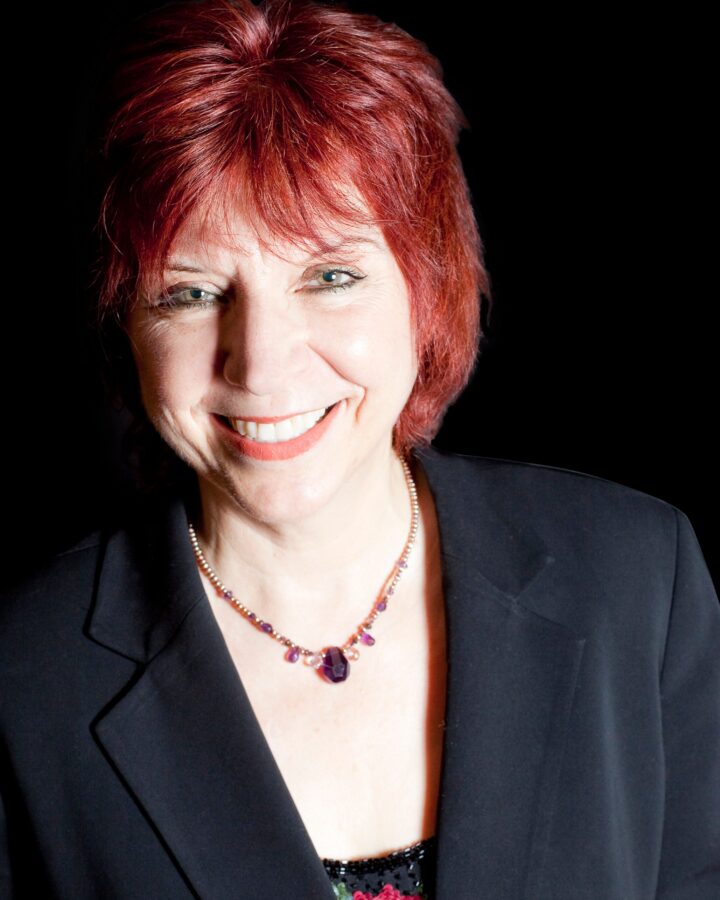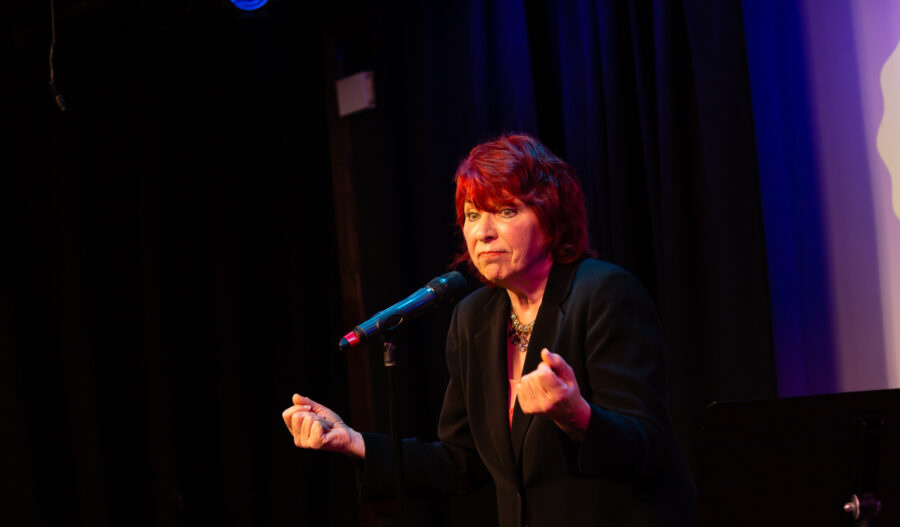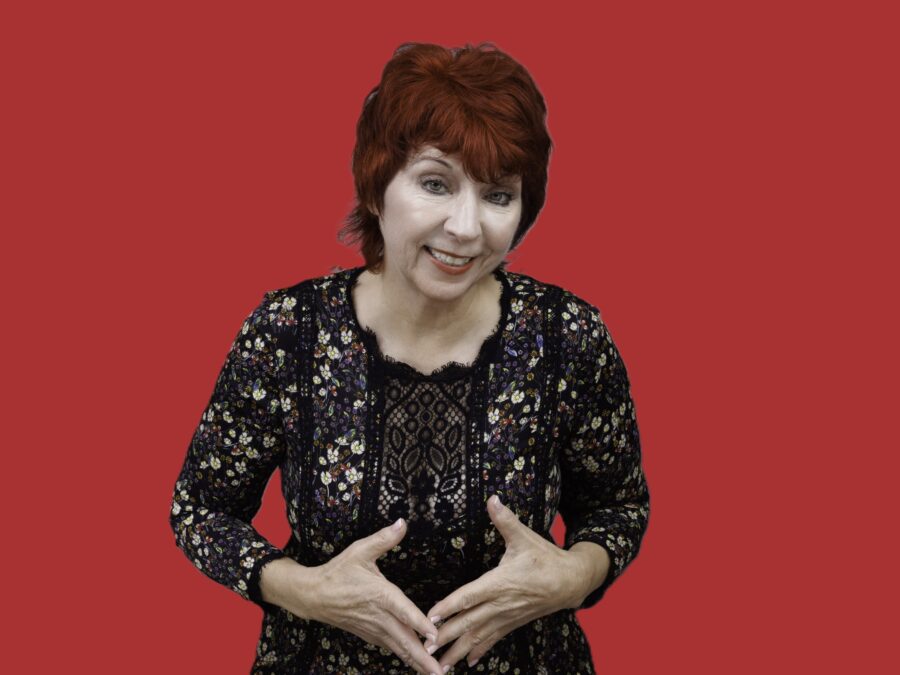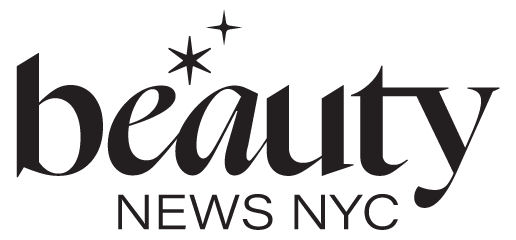I have been a fan of the New York City Fringe Festival since I was a teenager. While the shows featured are underdogs compared to larger productions, without massive budgets or existing fanbases to buoy them, they are consistently creative and original, often pushing limits in unsuspecting ways. Needless to say, I have not been able to get my fill of Fringe shows since my first festival experience. This is why I was very interested when I heard about “Faster,” a new comedic solo show from the brilliant mind of Jude Treder-Wolff, a storyteller, improviser, and psychotherapist to boot. “Faster” is Wolff’s take on the world speeding up, infused with lots of humor and wisdom throughout. As someone who is set to see the show on April 3rd, I couldn’t resist reaching out to her directly. Check out the below Q&A with Jude Treder-Wolff for her own words on “Faster,” her creative process, and more!

Can you share any specific moments or stories that inspired the narrative of “FASTER?”
I married a person whose approach to change is the exact opposite of mine, which is pretty much the whole ball game when it comes to partners going down the road of life together. My flaws are a willingness to leap almost blindly into something I think is important or fascinating, and downright denial of troubling details at times, while he has a strict “lots of looking, no leaping” policy and cannot look away from details. I prioritize adventure and momentum; he prioritizes security and stability. This tension makes for an interesting ride. We’re both different people because we found each other. The show chronicles this evolution, which has made me a more loving partner, more empathetic therapist, and more hopeful human at what I think is a challenging time in human history.
In 2010 my husband and I – both therapists who spent our lives dealing with the process of change – went to one of our favorite shared inner nerdfests, the World Science Festival, which is a week-long series of talks, presentations, and shows featuring some of the most brilliant minds to talk about science, mainly to help those of us without high science IQs to understand it. One panel we attended had this wild combination of physicists, tech gurus, novelists – Joyce Carol Oates and E.L. Doctorow- and science journalists. It was about how technology is evolving at something like 10 million times the natural speed of evolution, but our brains and emotional selves do not change quickly, and not without a real effort.
The novelists talked about how stories convey information and ideas that can help bridge the gaps between the way things were and what is new and emerging. But it was a group of improvisers who created scenes on the spot inspired by the panel discussion that gave me an unforgettable jolt and laid the groundwork for what grew into this show. The improvisers made comedy out of the ideas – and the concerns – the experts expressed without diminishing them in any way. The creativity and comedy helped me understand the information more deeply, and it felt effortless.
On our way home, I was going on and on about how I felt a part of my brain was activated in a wonderful way by watching the improv. I could only imagine what was possible through learning to actually do it, “What if we have just seen something that could put actual joy and fun and spontaneity into mental health treatment?” I said. My husband paused me and said, “Did you see that makeshift stage they had those performers on? It was very shaky. I was ready to rush up there if one of the improvisers got too close to the edge” That’s why we call him Captain Safety.
 How do you strike a balance between humor and sensitivity when tackling subject matter like the psychological toll of constant change?
How do you strike a balance between humor and sensitivity when tackling subject matter like the psychological toll of constant change?
I hope that telling true stories about my own flaws and flailing, my blind spots, and blunders as I’ve struggled to change, helps to strike that balance. And telling stories from inside a relationship that has the makings of “you could drive a person crazy,” but continues to be a “crazy for you” marriage has made audience members feel understood – because most people seem to see themselves in one of us – intrigued and empowered.
The mental health pressures we all feel from constant change with less time between action and consequences, and fewer periods of stability between one transition and the next are so universal. Just naming and exploring this out loud helps move us from reactive fear and stress to a more communal sense that something about our shared reality is messing with our heads. And that we need each other to figure it out, so let’s use the gifts of our differences, and build community.
Humor is truth with a twist. The twist that makes it funny is a creative and unexpected take that builds on the true thing and, therefore, helps us deal with it. If you think of a person’s life as a room, and pain or stress is like water flooding that space, the creative, comedic twist on some truth about it is like a raft that keeps us afloat on a rising tide.
Are there any strategies or insights you’ve discovered through your work as a therapist for recognizing and managing the psychological impact of change that you incorporate into the show?
When I started learning how to improvise and nerding out on the research so I could apply this in my work, I began to see that what creative experiences like improv are doing is expanding our capacity to think, to take in information, to relate, and to respond in real-time. It expands our emotional intelligence. It is growing our brains.
We can be spontaneous and tap into joy while at the same time honoring the dark and difficult realities we have to face. Around the time I discovered improvisation, my husband was diagnosed with a life-threatening heart condition that required a long, complicated surgery and a recovery that was unpredictable in its course. We were told that if he survived, he still might have long-term complications that could alter our lives completely.
At the time, I was taking improv classes that met for 3 hours twice a week. Learning to shift into an improviser’s mindset, shed the usual self-protective layers we have when dealing with the unfamiliar and relating to other people in full creative mode while going through one of the most vulnerable periods of my entire life was an absolute revelation. From my own experience, I could see that improv training changed my brain and my emotional approach to a painful reality. Instead of trying to anticipate what would happen next and generate anxiety that was no help at all, I was able to shift into a creative receptivity to the actual reality, to flow with what was happening, absorb information more readily, and be more present for actual joy that emerged throughout the whole experience. It turns out that making things up together helps us deal with reality.
 How do you leverage your diverse skills as an improviser, storyteller, and singer/songwriter, to create a compelling and dynamic performance in “FASTER?”
How do you leverage your diverse skills as an improviser, storyteller, and singer/songwriter, to create a compelling and dynamic performance in “FASTER?”
As a storyteller and songwriter, I write, and revise, and remake material until it is ready. With the help of a wonderful director, my performance of the material is shaped and prepared. Improv practice is like exercising the psychological “muscles” we need to change, adapt, learn, think on our feet, and create. It taps into spontaneity and free-range creativity, which is key to the process of putting the material together. The beats of the story and the carefully crafted material are like the lyrics of a song, and the energy of the performance on the day is the music. It was improv that liberated me to think of and deliver a performance this way.
“FASTER” is premiering at The New York City Fringe Festival, which has a reputation for spotlighting work that innovates and pushes boundaries. How does it feel for your show to be a part of this prestigious festival?
I am beyond thrilled to be part of the New York City Fringe. I am so deeply grateful for an opportunity to share this piece and for the enthusiastic support of the artistic community that makes the Fringe festival possible.
Get your tickets for “FASTER” online HERE.

